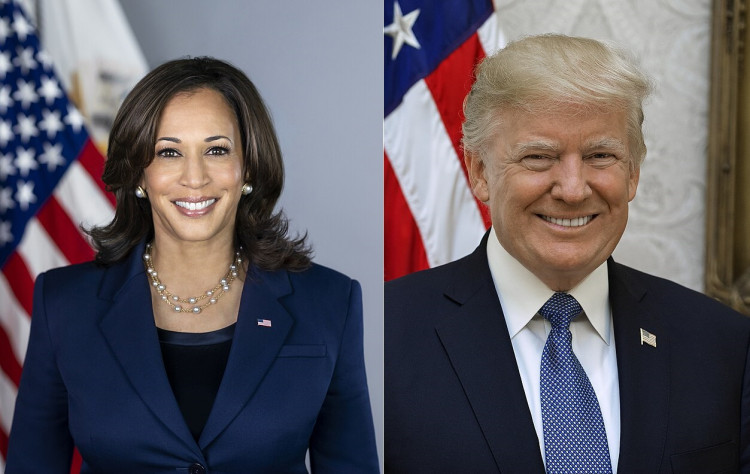Vice President Kamala Harris did not hold back over the weekend as she took aim at former President Donald Trump, deriding his tendency to go off-script at campaign rallies. In a pointed address at a rally in Atlanta, Harris criticized Trump's often meandering speeches, labeling his signature speaking style - which he calls "The Weave" - as a sign of having no clear plan to address the nation's needs. "He is only focused on himself," Harris said, calling for a shift in leadership for the country.
Trump, who recently described his approach as "The Weave" during a town hall event, insisted that his method was misunderstood by critics. "I do a thing called The Weave, and there are those that are fair that say, 'This guy is so genius!'" Trump told his supporters. He went on to defend his tendency to bounce between anecdotes, saying it was a deliberate style aimed at connecting different ideas and stories. However, Harris had a different take, calling his unstructured narrative style "just nonsense."
"He has no plan for how he would address the needs of the American people," Harris emphasized during her speech. "And now he's ducking debates and canceling interviews because of exhaustion!" Her remarks, met with laughter and applause from the audience, highlighted a growing narrative within her campaign that Trump's focus is not on the American people, but rather on his personal image.
Harris's remarks come as a new poll suggests that the vice president has edged ahead of Trump on key economic questions, challenging the former president's usual stronghold on economic credibility. According to an Associated Press/NORC poll, Harris now leads Trump in voters' preferences for handling middle-class taxes and housing policies. This marks a significant shift, as economic concerns consistently top the list of priorities for the American electorate.
In addition to her criticisms of Trump's rhetoric, Harris was keen to underscore the support she is gaining across the political spectrum. She noted that over 100 former Republican leaders, including some who previously worked for Trump, had joined her campaign trail earlier in the week. "Democrats, Republicans, and independents are supporting our campaign," Harris proclaimed, aiming to position herself as a unifier capable of bringing together diverse segments of the population.
Trump's erratic campaign strategy has become increasingly evident in recent weeks, with reports suggesting a rash of canceled interviews and an avoidance of another debate. House Speaker Mike Johnson defended Trump's focus on economic themes during a CNN interview, claiming that the former president's actions were secondary to the question of whether Americans felt they were better off now than during his administration.
"The big question - and the one that Kamala Harris has not been able to answer - is: are you better off now than under the Trump administration, four years ago?" Johnson said. He argued that voters' concerns over the cost of living, including inflation and rising prices, would ultimately benefit Trump.
However, Harris's campaign has been keen to confront these issues head-on, unveiling proposals for an "opportunity economy," including a promise to provide first-time homebuyers with $25,000 toward a down payment. This approach is intended to resonate particularly with middle-class and working-class voters, who have faced increased financial pressures in recent years.
Bill Clinton, the former Democratic president, has also been deployed by the Harris campaign to bolster her economic message, particularly among rural and Black voters. Clinton's presence on the campaign trail recalls his 1992 campaign, which focused heavily on economic issues and coined the famous phrase "It's the economy, stupid." At a recent rally in Wilmington, North Carolina - a battleground state where Harris and Trump are in a tight race - Clinton praised Harris's proposals as the kind of measures that could genuinely improve the economic standing of average Americans.
"She wants to help the middle class and working people with lower incomes work their way into the middle class," Clinton told the crowd. He also acknowledged the inflation that occurred during President Joe Biden's administration but defended the broader economic achievements made under Democratic leadership.
Trump, meanwhile, has continued to frame his speeches around a critique of Biden's handling of inflation and rising costs, often dismissing Harris's responses as inadequate. His insistence that his own speaking style - including references to obscure anecdotes like "Doctor Hannibal Lecter" from Silence of the Lambs - is actually a sophisticated method of connecting ideas, has left some observers puzzled. "If you couldn't connect the dots, you got a problem, but every dot was connected," Trump claimed, defending his approach as "genius."
For Harris, however, the emphasis is clear: it's time for a change. She concluded her Atlanta rally with a call for a new kind of leadership, one focused on addressing the needs of all Americans rather than indulging in spectacle and personal promotion. "It's time to turn the page," she urged. "America is ready to chart a new way forward. We are ready for a new and optimistic generation of leadership."






